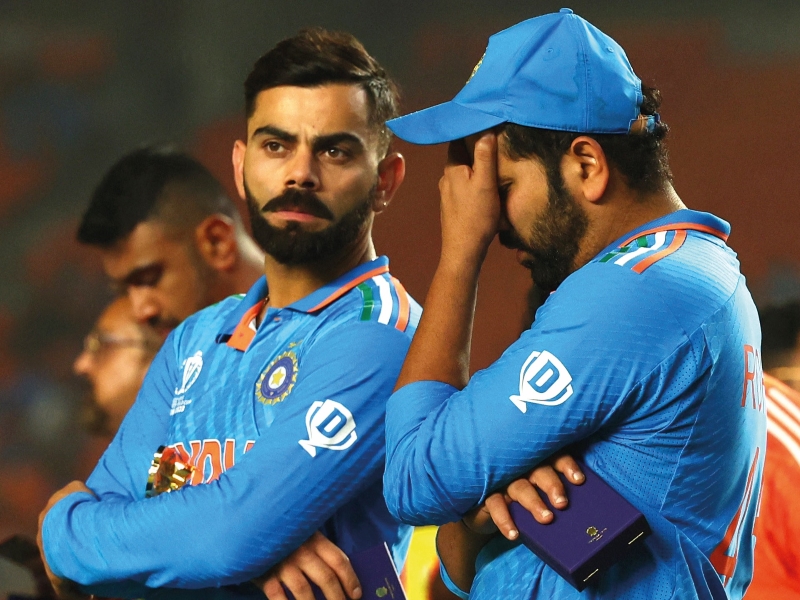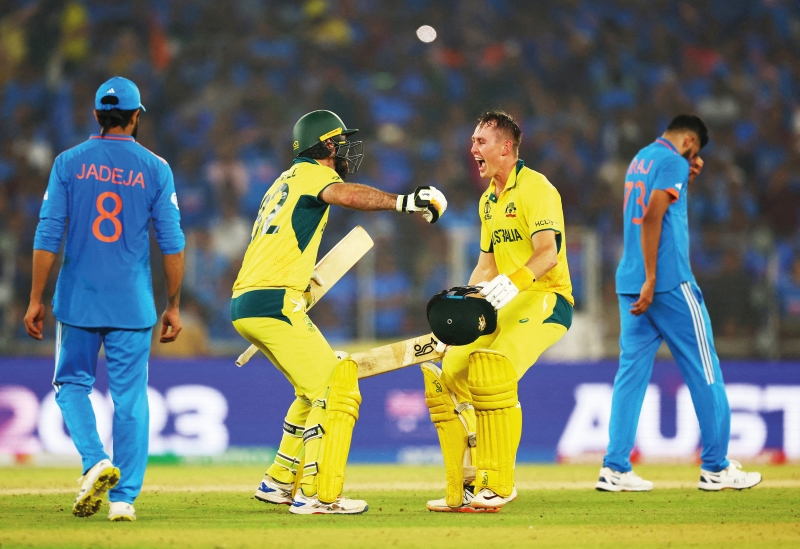
Australia's Travis Head and Marnus Labuschagne pose for a photo with the trophy as they celebrate after beating India by 6 wickets in the ICC Men's Cricket World Cup 2023 final match at Narendra Modi Stadium in Ahmedabad (All photos: Reuters)
It was a day of deafening sounds and dazzling lights, with pyrotechnics on and off the field. It was a day when India crashed and burned but it will be the silence that is remembered most. The silence that greeted every Australian boundary and a longer, mournful silence at the end. As the dew settled, cricket’s great colosseum in Ahmedabad, India, resembled a giant morgue. The only noise came from the breaking of 100,000 hearts.
Australia celebrated a sixth World Cup triumph and the world’s most populous nation was crestfallen. But it had been quite a spectacle. A heaving, swaying blue ocean of humanity at what at times felt like the first World Cup to be concurrently held with a sound and light show.
India has put its own stamp on cricket and never was it more apparent than here. Ashis Nandy even claimed, “Cricket is an Indian game accidentally discovered by the English”. Well, this scene was so far removed from its village-green origins that you would wonder if it was the same game and the same planet. An extravaganza of Bollywood stars and billionaires, and for Prime Minister Narendra Modi who visited the stadium named after him, hoping to catch the feel-good votes from an anticipated victory.
To a billion Indians, it felt like a heist. Not that the Aussies didn’t deserve to win — they did and this was graciously acknowledged by the Indian players at least — but it was not supposed to happen. A home win had seemed preordained: they had won their last 10 games and were, by a distance, the team of the tournament. And in front of 100,000 of their own beseeching fans. They couldn’t let them down, could they?
2023-11-19t172615z_518821414_up1ejbj1cfpy0_rtrmadp_3_cricket-worldcup-ind-aus.jpg

To say they choked would be harsh. They might have won had a couple of pivotal moments gone their way. Ace batter Virat Kohli was looking ominous until he dragged onto his stumps. Similarly, well-set skipper Rohit Sharma perished to a wonderful diving catch by man-of-the-match Travis Head. But this is sport and sport is anything but preordained. Head’s catch was just an overture. He came in when India were on top and hit a symphonic 137, the match-winning innings.
Everything had been done to serve up the trophy on a platter to the home side: India had the best run to the final, the best batter, best bowler and pitches chosen by the Board of Control for Cricket in India who even overruled the sport’s pitch supremo for their semi-final surface against New Zealand. Never had a World Cup felt so partisan. Critics who pointed this out found themselves banned from the commentary box for the final.
After all that, it felt like a poet had a hand in meting out justice. Their choice of final pitch hindered them and so great were the expectations, the players wilted under the weight. So in the end, it was a merciful triumph for the unpredictability of sport as well as a memorable one for the battle-hardened men from Down Under. India gets its way off the field but on it, it is a different story.
For Australia, it was a sixth win in 13 editions, just months after retaining the Ashes in England, where they also beat India in the World Test Championship. It makes them the pre-eminent nation. In fact, you can almost apply Gary Lineker’s famous quote about Germany in football: cricket being a game where 22 men run around and Australia end up winning.
If that is leaning towards unhealthy dominance, it’s nothing compared to what the Indian Board exerts off the field. Enriched and emboldened by the runaway success of the Indian Premier League (IPL), it calls the shots on the calendar and bullies the smaller nations. Indeed, it is why many neutrals (both fans and pundits) around the world felt that an Indian defeat would be good for the game.
Poor organisation of aspects of this World Cup showed where their priority lay — with the IPL. Indeed, ticket chaos and dodgy pitches led some to believe that it was to make sure this tournament would not steal the thunder from the IPL. And it came nowhere close.
2023-11-19t161932z_1490791671_up1ejbj193jtd_rtrmadp_3_cricket-worldcup-ind-aus.jpg

This World Cup, which began six long weeks ago, needed a gripping final. But it was not gripping enough. It had taken too long to get here with just one game a day for only 10 countries. Like its rugby counterpart, which ran alongside for a time, it lacked football’s four-game-a-day intensity and never really came to the boil.
Australia started slowly too, losing their first two games and needing a miracle against Afghanistan in Mumbai. Glenn Maxwell’s 201 will go down as one of the greatest innings in the history of cricket — any form of cricket. Chasing 292, the Aussies were down for the count at 91 for 7, while Maxwell was suffering cramps and dehydration. But showing true Aussie grit, he launched an astonishing assault to take them home.
This is what sport is all about but there were precious few such highlights as the tourney dawdled on. The World Cup’s 50-over format is an all-day (or day-night) affair whereas the IPL’s 20 overs a side can be done and dusted in three hours. Through that, cricket is reaching parts of the world that the longer format never reached, including the Olympics. More people are playing and watching it, but it’s barely recognisable from its origins.
Still, it unites India like nothing else, which is ironic as it was the maharajahs who first took it up under the British Raj. Two Indian princes excelled only to play for England more than a century ago. But the depth of feeling in the crowd — the silence from 100,000 people is something to behold — shows what it means now, its spread beyond the elite.
There was a symmetry about the tournament that India never intended. Both the opening match and the final will be remembered for their emptiness — although for very different kinds. At the opener, indifference to any other country made the stadium seem like an echo chamber. But the sense of emptiness at the final was when it was full — of anti-climax.
This article first appeared on Nov 27, 2023 in The Edge Malaysia.


